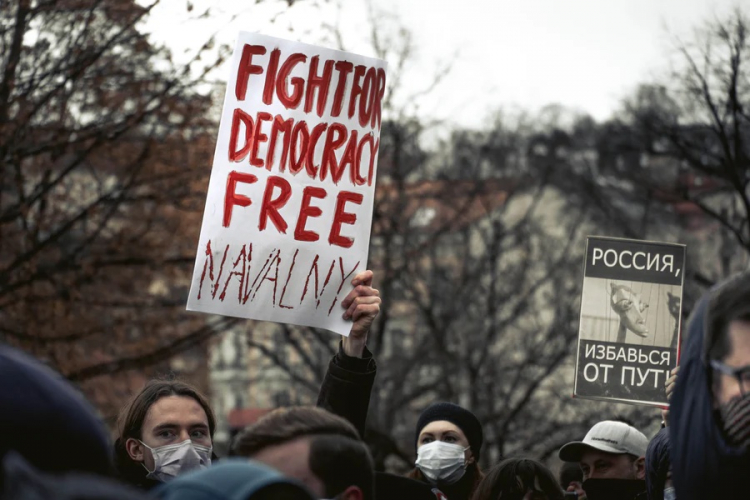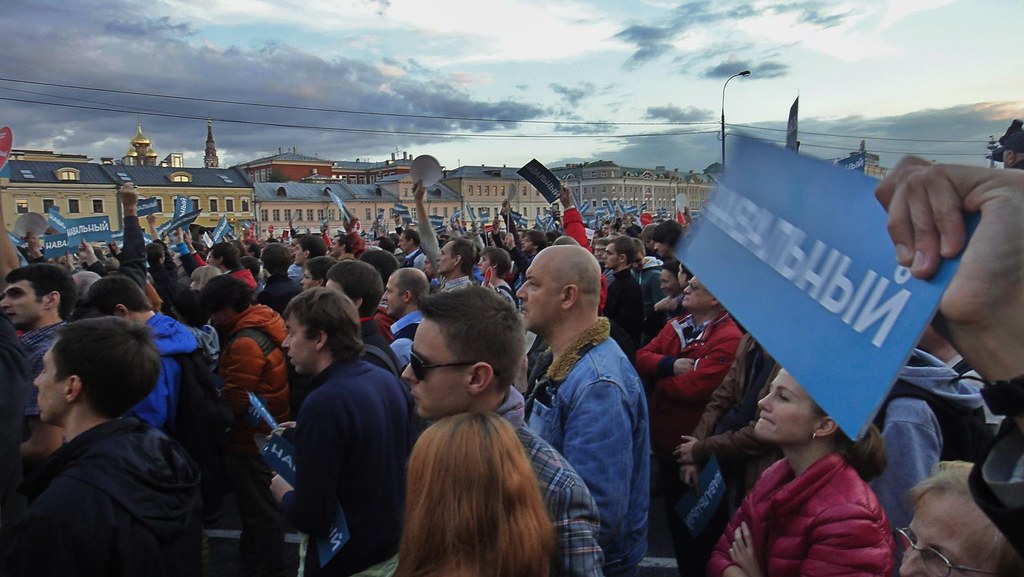Freedom of Speech in Modern Russian Society

"If liberty means anything at all, it means the right to tell people what they do not want to hear," -George Orwell.
Are you politically active? Do you perform a role of a righteous citizen? And at last, who do you consider a citizen? All of these questions go through our minds at least once in a lifetime and the answers can be interpreted in many ways. For Aristotle, a citizen is a person who actively partakes in government. In other words, they realize their responsibility for occurring events. Yet, somewhere on the road, many have lost the sense of this responsibility and decided that it is easier to succumb to political circumstances and ideologies. And where did this ignorance lead?
In Russia, for example, this irresponsibility has been giving a green light to a high-positioned office to free-act upon any situation that might question its legitimacy, and consequently, to undertake harsh arrangements toward disobedience. Is it safe to express discontent? Moreover, is it safe to publicly express your disapproval? The answer is simple, say something that government does not like and you will be hated, or even poisoned. It depends on your luck. Do you find it extreme? Well, the story suggests otherwise.
Russia and the Post-Soviet states have never been famous for practicing democracy or freedom of speech hitherto. Philip Golub concludes accurately that the reason behind the absence of freedom of speech is in the constitutional foundation. At first imperialistic, it becomes a part of the Soviet Union where freedom of speech does make its first appearance, though at the end of the day, all attempts are vain. Therefore, it is simply ridiculous for modern political activists to demand an immediate change in ideology and societal consciousness. It's obvious that something that was never present cannot just appear by a wave of the wand. Philip Golub also emphasizes that it is important to remember that Vladimir Putin tried to pull Russia out of crisis after Soviet Union's fall, though at expense of freedom of speech. Before achieving total freedom of speech Russia needs to undertake not only constitutional changes, but also develop mechanisms for the regular peaceful transfer of power according to well-defined institutional laws. Fortunately Russian society still adheres to an idea of freedom of expression, especially a political one. The recent event has turned the existing system upside down with protests, discontent, and street outrage surrounding an evergreen question of justice.
A curious reader might wonder why people need to rally in times when COVID-19 still runs among our streets. The answer is within one person, Alexei Navalny. An opposition activist, lawyer, and most importantly anti-corruption activist, Alexei Navalny is an infamous figure for the Russian government. The word "opposition" already implies an unsafe environment for a resistance leader. One immediately thinks of Rwanda, and how the members of opposition groups are killed. Navalny is brave enough to expose politicians and their wrong-doings. His investigations get millions of views on his YouTube channel, and he certainly has gained recognition on both national and international levels.
As an opposition activist, Navalny has been arrested numerous times. The infamous Yves Rocher case, and all previous arrests, prevented today's Russian hero from running as a president in 2018. When one thinks logically, it is possible to suggest that arrests might have been staged to legally prevent Navalny from running in elections. A perfect legal plan to get rid of a nationally-loved candidate. The story does not end here. On 20 August 2020, Navalny fell sick and was hospitalized. Navalny decided to undertake an investigation and found out that he was poisoned by the Russian government itself. Yet unsurprisingly, the Kremlin denies its involvement, and on 17 January 2021 Navalny was detained following his arrival in Moscow’s Sheremetyevo airport. The detainment sparked outrage not only on people's side but on an international level as well. The #FreeNavalny and #navalny have gained incredible recognition and fame within a couple of days, and on 23 January 2021, people protested in the streets, calling for justice for Navalny.
Yet at the same time, some people call Navalny a Western agent, who wants to push new sets of rules influenced by the Western government. Philip Golub, however, does not agree with this statement saying, "Of course there is a presence of American and Western influence in a current situation in Russia. Nonetheless, it is important to distinguish between the cause and the correlation. External interference would not cause such massive outrage. Domestic political forces play a much significant role in this situation. When people call Navalny a U.S. agent, it is a simple political move to discredit Navalny in the eyes of society, and deprive him of mass support." Many people question whether Navalny's unfiltered speeches and brave behavior are appropriate in a country where freedom of speech has never been of great importance, but at the same time, others argue that it always comes to the point where people are desperate for a change, and they need a right to voice their voice.
Image credit: arfolomeev/Creative CommonsThough the Russian government openly shows that Navalny does not present any danger to a current political ideology, it is quite obvious that his detainment conversely showed that he is capable of mobilizing people, and his persona is one the first serious threats to a Russian government. Evidently, Europe and the U.S. are seeking their own interest in supporting Navalny with one part of the western world is hoping to benefit economically, while the other part does not want to maintain codependency with Russia. Nevertheless, "Navalny is not a puppet in western hands," says Philip Golub. Both sides are clearly benefiting from each other. Navalny needs international support to get out of jail, and consequently, to continue spreading the word on the domestic stagnation. The West, simultaneously, sees Navalny as a way to finally fully democratize Russia. It is also possible to develop a conspiracy theory, and suggest that protests are simply paid by influential political groups who play a game against Vladimir Putin through the people. However, it was emphasized accurately by Abraham Lincoln. "You can fool all of the people some of the time; you can fool some of the people all of the time, but you cannot fool all the people all the time." Do you think this quote unambiguously suggests that there is probably no conspiracy theory, and people are sincerely calling for a change because they have had enough?
One might argue that Navalny should have thought of consequences, but is this the right position? Can silence ever be heard? And once silence is disrupted, can one be safe? Many people claim that they are not interested in politics. However, in times like ours, it is irresponsible to stand on the sidelines and observe. This position only leads to anarchy and chaos and prepares a fertile soil for demagogues. Russian people are not satisfied with the current system; they are filled with indignation. The situation is reminiscent of the book by George Orwell 1984. Specifically, the quote, "Big Brother is watching You." It is still unclear what will happen to neither Navalny nor the Russian community. The only palpable thing is that no one is safe, and many countries, even the most advanced ones, still have a long road to absolute freedom of speech. But do you think the absolute freedom of speech is something that people need?








